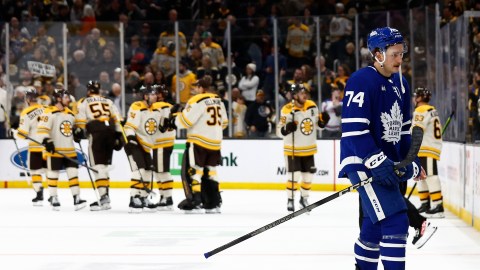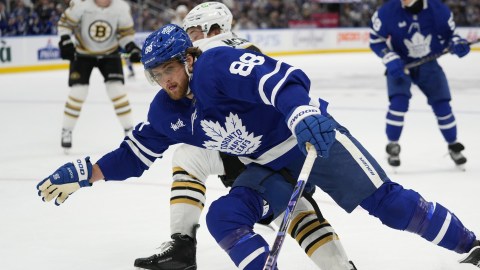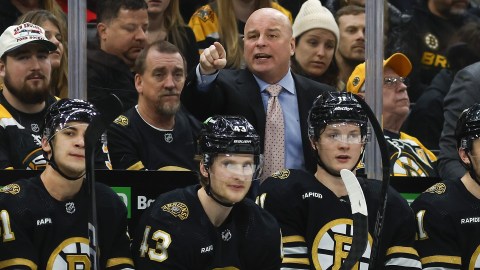The first shot of the next great hockey labor war has been fired.
The NHL sent one right across the players’ association’s bow, as the league succeeded in blocking Ilya Kovalchuk’s record contract with New Jersey. After two days of hearings in Boston last week, arbitrator Richard Bloch ruled Monday that the league was acting within its rights to reject the 17-year, $102 million deal for circumventing the league’s salary cap.
With the league’s collective bargaining agreement (CBA) due to expire in 2012, both the NHL and the union are gearing up for a long and bloody struggle. The last negotiations cost hockey an entire season as the owners locked out the players in 2004-05 before hammering out a deal that included a salary cap for the first time. Now the league is looking to close any loopholes in that CBA, in preparation for what could be an even nastier round of negotiations in two years.
Kovalchuk, 27, was due to receive $95 million of the $102 million in the first 10 years of the deal, while five years at a minimal $550,000 salary were tacked on to the end to bring the overall cap hit to a more manageable $6 million a year. Kovalchuk would have been 44 in the final year of that deal, likely well into a prosperous retirement by that point.
So what does this decision mean? Will it be the end of front-loaded deals to reduce cap hits, or just the end of the most egregious and obvious ones? The NHL reluctantly agreed to similar long-term deals for Marian Hossa, Chris Pronger and the Bruins’ Marc Savard, among others, but the Kovalchuk deal was simply too brazen to be ignored.
The league could still look the other way on shorter deals that lower cap hits like Savard’s seven-year extension, which pays him $25.5 million of the $28.05 million he’s due in the first four years of the deal. Or they could crack down even harder and reject any such deals now that Kovalchuk’s precedent is on the books.
That could greatly affect the Bruins, who have both Zdeno Chara and Patrice Bergeron heading into the final years of their contracts. General manager Peter Chiarelli has gone on record several times this summer to state that extension negotiations are ongoing with both players, but without being able to reduce the cap hits for at least one of those players, it will be very difficult to sign both without shedding salary somewhere else.
Chara, in particular, would be in a perfect situation to sign a so-called "retirement deal," as the 33-year-old defenseman has expressed a desire to stay in Boston, is likely looking at one final big payday and would squeak in under the over-35 rule that prevents salaries from coming off the cap even if a player retires. That rule is part of the reason Tim Thomas is so hard to move, as only a trade or long-term injury would offer any relief for his $5 million annual hit, as his current contract went into effect after he turned 35.
The Kovalchuk decision could impact the Bruins in other ways. He is now an unrestricted free agent once again. The Devils are still free to try to reach a new deal that the league would approve, but that may be difficult to accomplish unless Kovalchuk greatly reduces the amount of money he is seeking. New Jersey was already going to be forced to shed salary to get under the cap with the Kovalchuk deal as it was. A new deal with a higher cap hit would create even more problems, especially with star forward Zach Parise due to become a free agent after this season.
With Kovalchuk back on the market, the Kings could decide to court him once again. Los Angeles tried to land him before dropping out of the bidding when New Jersey dropped its $102 million bomb. But the Kings have plenty of cap space and could be a Cup contender with a game-breaker like Kovalchuk added to their lineup.
Kovalchuk heading to L.A. would be welcome news to the Bruins, since it would take one of the game’s premier talents away from one of their rivals and out of the Eastern Conference altogether. It could also alter the potential trade market for Savard. If the Kings were to sign Kovalchuk, they would obviously be in win-now mode, and might be willing to offer an attractive package for Savard to reunite the skilled playmaker with his former Atlanta linemate.
It’s still debatable whether the Bruins, who are looking to contend themselves, should be trading away their top offensive performer. But at least this scenario could bring a palatable return while solving Boston’s cap issues.
Kovalchuk is holding all the cards, but after this ruling there’s probably going to be a lot less money on the table for him. He’ll likely have to settle for a lesser deal from either the Devils or Kings or any other NHL suitor that decides to jump into the bidding late. His other option would be to return to Russia, where KHL power St. Petersburg might be willing to fork over the kind of money Kovalchuk thought he would be getting in New Jersey.
If Kovalchuk were to leave the NHL for the KHL, then regardless of any advantage the league might have gained against the union, this arbitration ruling would prove a Pyrrhic victory for the NHL.



